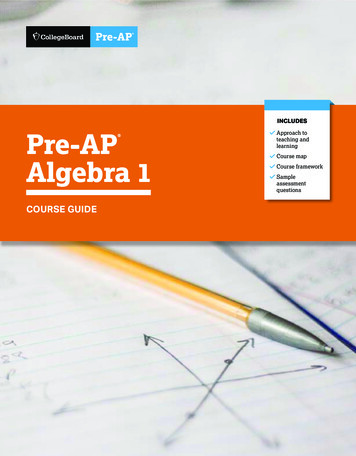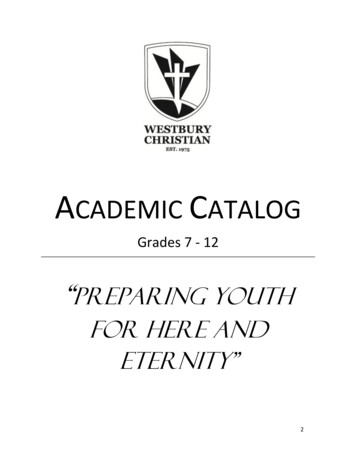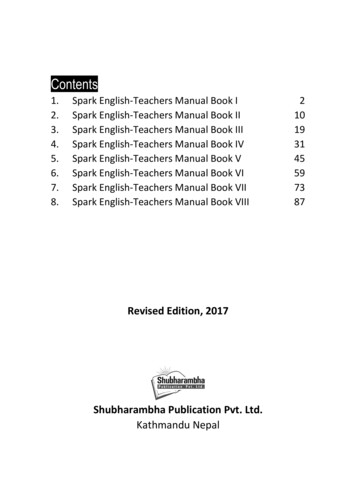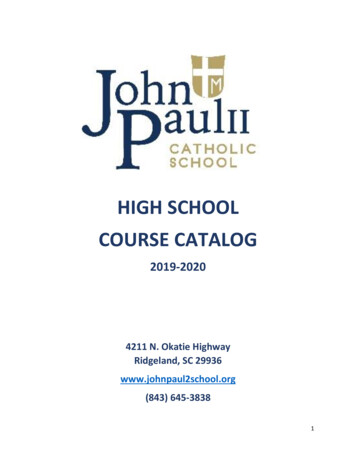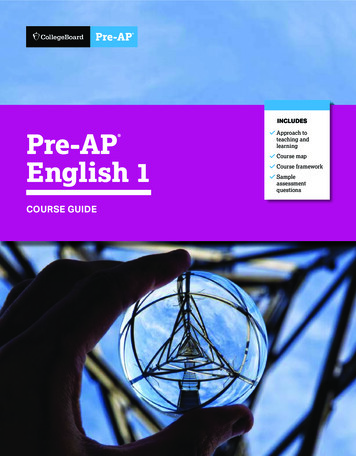
Transcription
INCLUDESPre-APEnglish 1 COURSE GUIDEApproach toteaching andlearningCourse mapCourse frameworkSampleassessmentquestions
Pre-APEnglish 1 COURSE GUIDEUpdated Fall 2020Please visit Pre-AP online at preap.collegeboard.org for more information and updates aboutthe course and program features.
ABOUT COLLEGE BOARDCollege Board is a mission-driven not-for-profit organization that connects students to collegesuccess and opportunity. Founded in 1900, College Board was created to expand accessto higher education. Today, the membership association is made up of over 6,000 of theworld’s leading educational institutions and is dedicated to promoting excellence and equityin education. Each year, College Board helps more than seven million students prepare fora successful transition to college through programs and services in college readiness andcollege success—including the SAT and the Advanced Placement Program . The organizationalso serves the education community through research and advocacy on behalf of students,educators, and schools.For further information, visit www.collegeboard.org.PRE-AP EQUITY AND ACCESS POLICYCollege Board believes that all students deserve engaging, relevant, and challenging gradelevel coursework. Access to this type of coursework increases opportunities for all students,including groups that have been traditionally underrepresented in AP and college classrooms.Therefore, the Pre-AP program is dedicated to collaborating with educators across the countryto ensure all students have the supports to succeed in appropriately challenging classroomexperiences that allow students to learn and grow. It is only through a sustained commitment toequitable preparation, access, and support that true excellence can be achieved for all students,and the Pre-AP course designation requires this commitment.ISBN: 978-1-4573-1415-5 2021 College Board. PSAT/NMSQT is a registered trademark of College Board and National MeritScholarship Corporation.1 2 3 4 5 6 7 8 9 10
ContentsvAcknowledgmentsABOUT PRE-AP33Introduction to Pre-APDeveloping the Pre-AP Courses4How to Get Involved3Pre-AP Educator Network55Pre-AP Approach to Teaching and LearningFocused Content7Targeted Assessments for Learning58Horizontally and Vertically Aligned InstructionPre-AP Professional LearningABOUT PRE-AP ENGLISH 11111Introduction to Pre-AP English 1Pre-AP English Areas of Focus14Summary of Resources and Supports1216Pre-AP English and Career ReadinessCourse Map1818Pre-AP English High School Course FrameworkIntroduction20Big Idea: Engaging with Texts27Big Idea: Focusing on Language19232931Course Framework ComponentsBig Idea: Constructing TextsBig Idea: Investigating Through ResearchBig Idea: Entering the Conversation3334Pre-AP English Model LessonsSupport Features in Model Lessons3535Pre-AP English 1 Assessments for LearningLearning Checkpoints37Sample Performance Task and Scoring Guidelines3640414648Performance TasksFinal ExamSample Assessment ItemsPre-AP English 1 Course DesignationAccessing the Digital Materials
AcknowledgmentsCollege Board would like to acknowledge the following committee members, consultants, andreviewers for their assistance with and commitment to the development of this course. All individualsand their affiliations were current at the time of contribution.Joshua Arnold, Catch Prep Charter High School, Los Angeles, CAJim Burke, Middle College High School, San Mateo, CALuAnn Fox, Olathe High School, Olathe, KSKathy Galford, Great Bridge Primary School, Chesapeake, VAJohn Golden, Grant High School, Portland, ORJeanneine Jones, University of North Carolina at Charlotte, Charlotte, NCErnest Morrell, Notre Dame University, Notre Dame, INVince Puzick, District 11 (Retired), Colorado Springs, COAnne Severson, Excel High School, Boston, MASayuri Stabrowski, KIPP Infinity Middle School, New York, NYDoranna Tindle, Friendship Public Charter School, Washington, D.C.COLLEGE BOARD STAFFGeorgia Scurletis, Senior Director, ELA/Literacy, Pre-AP Curriculum, Instruction, and AssessmentJoely Negedly, Senior Director, Pre-AP Curriculum, Instruction, and AssessmentBeth Hart, Senior Director, Pre-AP AssessmentLaura Smith, Director, Pre-AP AssessmentNatasha Vasavada, Executive Director, Pre-AP Curriculum, Instruction, and Assessment
About Pre-AP
About Pre-APIntroduction to Pre-APEvery student deserves classroom opportunities to learn, grow, and succeed. College Boarddeveloped Pre-AP to deliver on this simple premise. Pre-AP courses are designed to supportall students across varying levels of readiness. They are not honors or advanced courses.Participation in Pre-AP courses allows students to slow down and focus on the most essentialand relevant concepts and skills. Students have frequent opportunities to engage deeply withtexts, sources, and data as well as compelling higher-order questions and problems. AcrossPre-AP courses, students experience shared instructional practices and routines that helpthem develop and strengthen the important critical thinking skills they will need to employ inhigh school, college, and life. Students and teachers can see progress and opportunities forgrowth through varied classroom assessments that provide clear and meaningful feedback atkey checkpoints throughout each course.DEVELOPING THE PRE-AP COURSESPre-AP courses are carefully developed in partnership with experienced educators, includingmiddle school, high school, and college faculty. Pre-AP educator committees work closelywith College Board to ensure that the course resources define, illustrate, and measure grade-level-appropriate learning in a clear, accessible, and engaging way. College Board also gathersfeedback from a variety of stakeholders, including Pre-AP partner schools from across thenation who have participated in multiyear pilots of select courses. Data and feedback frompartner schools, educator committees, and advisory panels are carefully considered to ensurethat Pre-AP courses provide all students with grade-level appropriate learning experiencesthat place them on a path to college and career readiness.PRE-AP EDUCATOR NETWORKSimilar to the way in which teachers of Advanced Placement (AP ) courses can becomemore deeply involved in the program by becoming AP Readers or workshop consultants, PreAP teachers also have opportunities to become active in their educator network. Each year,College Board expands and strengthens the Pre-AP National Faculty—the team of educatorswho facilitate Pre-AP Readiness Workshops and Pre-AP Summer Institutes. Pre-AP teacherscan also become curriculum and assessment contributors by working with College Board todesign, review, or pilot course resources.Course Guide 2021 College Board3Pre-AP English 1
About Pre-APIntroduction to Pre-APHOW TO GET INVOLVEDSchools and districts interested in learning more about participating in Pre-AP should visitpreap.collegeboard.org/join or contact us at preap@collegeboard.org.Teachers interested in becoming members of Pre-AP National Faculty or participatingin content development should visit preap.collegeboard.org/national-faculty or contact us atpreap@collegeboard.org.Pre-AP English 14Course Guide 2021 College Board
About Pre-APPre-AP Approach to Teaching and LearningPre-AP courses invite all students to learn, grow, and succeed through focused content,horizontally and vertically aligned instruction, and targeted assessments for learning. ThePre-AP approach to teaching and learning, as described below, is not overly complex, yet thecombined strength results in powerful and lasting benefits for both teachers and students.This is our theory of action.Horizontally andVertically AlignedInstructionShared Principles,Areas of FocusFocused ContentCourse Frameworks,Model LessonsTargeted Assessmentsand FeedbackLearning Checkpoints,Performance Tasks,Final ExamFOCUSED CONTENTPre-AP courses focus deeply on a limited number of concepts and skills with the broadestrelevance for high school coursework and college and career success. The course frameworkserves as the foundation of the course and defines these prioritized concepts and skills. Pre-AP model lessons and assessments are based directly on this focused framework. The coursedesign provides students and teachers with intentional permission to slow down and focus.HORIZONTALLY AND VERTICALLY ALIGNED INSTRUCTIONShared principles cut across all Pre-AP courses and disciplines. Each course is also alignedto discipline-specific areas of focus that prioritize the critical reasoning skills and practicescentral to that discipline.Course Guide 2021 College Board5Pre-AP English 1
About Pre-APPre-AP Approach to Teaching and LearningSHARED PRINCIPLESAll Pre-AP courses share the following set of research-supported instructional principles.Classrooms that regularly focus on these cross-disciplinary principles allow students toeffectively extend their content knowledge while strengthening their critical thinking skills.When students are enrolled in multiple Pre-AP courses, the horizontal alignment of the sharedprinciples provides students and teachers across disciplines with a shared language fortheir learning and investigation, and multiple opportunities to practice and grow. The criticalreasoning and problem-solving tools students develop through shared principles are highlyvalued in college coursework and in the workplace.Close Observationand ngSHAREDPRINCIPLESAcademicConversationCLOSE OBSERVATION AND ANALYSISStudents are provided time to carefully observe one data set, text, image, performance piece,or problem before being asked to explain, analyze, or evaluate. This creates a safe entry pointto simply express what they notice and what they wonder. It also encourages students to slowdown and capture relevant details with intentionality to support more meaningful analysis,rather than rushing to completion at the expense of understanding.HIGHER-ORDER QUESTIONINGStudents engage with questions designed to encourage thinking that is elevated beyondsimple memorization and recall. Higher-order questions require students to make predictions,synthesize, evaluate, and compare. As students grapple with these questions, they learn thatbeing inquisitive promotes extended thinking and leads to deeper understanding.EVIDENCE-BASED WRITINGWith strategic support, students frequently engage in writing coherent arguments fromrelevant and valid sources of evidence. Pre-AP courses embrace a purposeful and scaffoldedapproach to writing that begins with a focus on precise and effective sentences beforeprogressing to longer forms of writing.Pre-AP English 16Course Guide 2021 College Board
About Pre-APPre-AP Approach to Teaching and LearningACADEMIC CONVERSATIONThrough peer-to-peer dialogue, students’ ideas are explored, challenged, and refined. Asstudents engage in academic conversation, they come to see the value in being open tonew ideas and modifying their own ideas based on new information. Students grow as theyfrequently practice this type of respectful dialogue and critique and learn to recognize that allvoices, including their own, deserve to be heard.AREAS OF FOCUSThe areas of focus are discipline-specific reasoning skills that students develop and leverageas they engage with content. Whereas the shared principles promote horizontal alignmentacross disciplines, the areas of focus provide vertical alignment within a discipline, givingstudents the opportunity to strengthen and deepen their work with these skills in subsequentSocial StudiesScienceMathematicsArtsEnglishcourses in the same discipline.Areas of FocusAlign Vertically Within Disciplines(Grades 6-12)Academic ConversationHigher-Order QuestioningEvidence-Based WritingClose Observation and AnalysisShared PrinciplesAlign Horizontally Across All CoursesFor a detailed description of the Pre-AP English areas of focus, see page 11.TARGETED ASSESSMENTS FOR LEARNINGPre-AP courses include strategically designed classroom assessments that serve as toolsfor understanding progress and identifying areas that need more support. The assessmentsprovide frequent and meaningful feedback for both teachers and students across each unit ofthe course and for the course as a whole. For more information about assessments in Pre-APEnglish 1, see page 35.Course Guide 2021 College Board7Pre-AP English 1
About Pre-APPre-AP Professional LearningThe summer before their first year teaching a Pre-AP course, teachers are required toengage in professional learning offered by College Board. There are two options to meet thisrequirement: the Pre-AP Summer Institute (Pre-APSI) and the Online Foundational ModuleSeries. Both options provide continuing education units to educators who complete thetraining. The Pre-AP Summer Institute is a four-day collaborative experience that empowersparticipants to prepare and plan for their Pre-AP course. While attending, teachers engagewith Pre-AP course frameworks, shared principles, areas of focus, and sample modellessons. Participants are given supportive planning time where they work with peers tobegin to build their Pre-AP course plan. The Online Foundational Module Series will be available beginning July 2020 to allteachers of Pre-AP courses. These 12- to 20-hour courses will support teachers inpreparing for their Pre-AP course. Teachers will explore course materials and experiencemodel lessons from the student’s point of view. They will also begin to plan and build theirown course materials, so they are ready on day one of instruction.Pre-AP teachers also have access to the Online Performance Task Scoring Modules, whichoffer guidance and practice in applying Pre-AP scoring guidelines to student work.Pre-AP English 18Course Guide 2021 College Board
About Pre-APEnglish 1
About Pre-AP English 1Introduction to Pre-AP English 1Texts take center stage in the Pre-AP English 1 classroom, inspiring and preparing all studentsfor close, critical reading and analytical writing. This course trains the reader to observe thesmall details in a text to arrive at a deeper understanding of the whole. It also trains the readerto appreciate authors’ sometimes-subtle choices, developing an awareness of how wordsproduce effects and how the conventions of the English language are used for both precisionand style. As writers, students focus first on crafting complex sentences, building thisfoundational skill; they then move on to producing well-organized paragraphs and, as the yearprogresses, more sophisticated, longer-form analyses.PRE-AP ENGLISH AREAS OF FOCUSThe Pre-AP English areas of focus, described below, are practices that students developand leverage as they engage with content. These areas of focus are vertically aligned to thepractices embedded in other English courses in high school, including AP, and in college,giving students multiple opportunities to strengthen and deepen their work with these skillsthroughout their educational career.These areas of focus help to identify and prioritize the practices that are so fundamental to thestudy of English that they occur consistently throughout the full course of study.ValuingEvidenceReadingCloselyEnglishAreas of FocusNoticingLanguageChoicesREADING CLOSELYStudents read closely and analyze a range of complex literary and informational texts.Pre-AP English encourages a focus on equipping students with the skills to engage directlywith a variety of literary and nonfiction texts. With that focus in mind, Pre-AP English isdesigned to include a culturally diverse body of texts that engage and challenge students withtheir range of complexity and use of compelling language. Priority is given to rich texts thatinvite close reading, analysis, and engaging text-based discussion.Course Guide 2021 College Board11Pre-AP English 1
About Pre-AP English 1Introduction to Pre-AP English 1VALUING EVIDENCEStudents value textual evidence and incorporate it effectively in writing and speaking.Careful reading includes the ability to base conclusions on textual details. In Pre-AP English,students learn the importance of sifting through and synthesizing those details in orderto identify the evidence that supports a position or analysis. Then, once the most relevantand compelling evidence has been identified, students learn how to embed that evidenceseamlessly into their written analyses, academic conversations, and oral presentations.Identifying and incorporating evidence is practiced extensively in the Pre-AP Englishclassroom as students learn to prioritize evidence and to assess the arguments of others.NOTICING LANGUAGE CHOICESStudents understand how writers and speakers use specific words and sentences tomove the thoughts, emotions, and actions of readers and listeners.Every word matters. This concept is reflected in Pre-AP English instructional resourcesthrough text-dependent questions and calling attention to “vocabulary across text,” whichhighlight how different authors use the same words in different ways to different effects.Students encounter word study throughout this course and confront questions such as“Why ‘squander’ instead of ‘spend’?” and “Is this writer using the word ‘narrow’ literally orfiguratively?” These types of questions compel students to consider each word as a writer’sdeliberate choice.PRE-AP ENGLISH AND CAREER READINESSReading closely and harnessing compelling evidence to build convincing analytical argumentsare skills that employers overwhelming view as foundational to success in the workplace. Astudy* for the Association of American Colleges and Universities found that 93% of employersagreed that a “demonstrated capacity to think critically, communicate clearly, and solvecomplex problems is more important than [a job candidate’s] undergraduate major.”The sense of urgency to identify and hire workers that have the ability to recognize and uselanguage in convincing and creative ways is only becoming more valuable as automationchanges the fundamental nature of many jobs. Despite the rise of automation, jobs that requirethe skills of artful and effective speaking and writing continue to be secure and valued.This growing emphasis on hiring employees who can clearly communicate their ideas is evidentin the diversity of occupations that most highly value “the ability to communicate information andideas in writing so others will es/LEAP/2013 EmployerSurvey.pdf†Based on occupations listed on the Occupational Information Network (O*NET). O*NET is developed under the sponsor-ship of the U.S. Department of Labor/Employment and Training Administration (USDOL/ETA) through a grant to the NorthCarolina Department of Commerce.Pre-AP English 112Course Guide 2021 College Board
About Pre-AP English 1Introduction to Pre-AP English 1Abilities — Written ExpressionThe ability to communicate information and ideas in writing so others will understand.Level of ImportanceOccupation91Editors91Poets, lyricists and creative writers85Geneticists85History teachers, postsecondary81Anthropologists81Neuropsychologists and clinical neuropsychologists81Technical writers81English language and literature teachers, postsecondary81Bioinformatics scientists81Historians81Industrial-organizational psychologistsSource: onetonline.org/find/descriptor/result/1.A.1.a.4For more information about careers related to English, teachers and students can visit andexplore the College Board’s Big Future resources: -literature-english.Course Guide 2021 College Board13Pre-AP English 1
About Pre-AP English 1Introduction to Pre-AP English 1SUMMARY OF RESOURCES AND SUPPORTSTeachers are strongly encouraged to take advantage of the full set of resources and supportsfor Pre-AP English 1, which are summarized below. Some of these resources must be used fora course to receive the Pre-AP Course Designation. To learn more about the requirements forcourse designation, see details below and on page 46.COURSE FRAMEWORKIncluded in this guide as well as in the Pre-AP English 1 Teacher Resources, the frameworkdefines what students should know and be able to do by the end of the course. It serves as ananchor for model lessons and assessments, and it is the primary document teachers can useto align instruction to course content. Use of the course framework is required. For moredetails see page 18.MODEL LESSONSTeacher resources, available in print and online, include a robust set of model lessons thatdemonstrate how to translate the course framework, shared principles, and areas of focus intodaily instruction. Use of the model lessons is encouraged but not required. For more detailssee page 33.LEARNING CHECKPOINTSAccessed through Pre-AP Classroom, these short formative assessments provide insightinto student progress. They are automatically scored and include multiple-choice andtechnology-enhanced items with rationales that explain correct and incorrect answers. Useof one learning checkpoint per unit is required. For more details see page 35.PERFORMANCE TASKSAvailable in the printed teacher resources as well as on Pre-AP Classroom, performance tasksallow students to demonstrate their learning through extended problem-solving, writing,analysis, and/or reasoning tasks. Scoring guidelines are provided to inform teacher scoring,with additional practice and feedback suggestions available in online modules on Pre-APClassroom. Use of each unit’s performance task is required. For more details see page 36.FINAL EXAMAccessed through Pre-AP Classroom, the final exam serves as a classroom-based, summative assessment designed to measure students’ success in learning andapplying the knowledge and skills articulated in the course framework. Administration ofthe final exam is encouraged but not required. For more details see page 40.Pre-AP English 114Course Guide 2021 College Board
About Pre-AP English 1Introduction to Pre-AP English 1PROFESSIONAL LEARNINGBoth the four-day Pre-AP Summer Institute (Pre-APSI) and the Online Foundational ModuleSeries support teachers in preparing and planning to teach their Pre-AP course. All Pre-APteachers are required to either attend the Pre-AP Summer Institute or complete themodule series. In addition, teachers are required to complete at least one OnlinePerformance Task Scoring module. For more details see page 8.Course Guide 2021 College Board15Pre-AP English 1
UNIT 1Course MapModel Lesson and Assessment SequencePLANThe course map shows how components are positioned throughoutthe course. As the map indicates, the course is designed to be taughtover 140 class periods (based on 45-minute class periods), for a totalof 28 weeks.Model lessons are included for approximately 50% of the totalinstructional time, with the percentage varying by unit.TEACHThe model lessons demonstrate how the course framework, Pre-APshared principles, and English areas of focus come to life in theclassroom.Shared Principles close observation and analysis higher-order questioning evidence-based writing academic conversationTelling DetailsGenre Focus: Short Stories andVisual TextsPre-AP Lesson Set (3–5 weeks)Engaging with Texts short fiction and visual images how authors use specificdetails to convey meaningsConstructing Texts complex sentences narrative paragraphs analytical paragraphsFocusing on Language punctuation in complexsentences and directquotations word meanings andrelationships effects of word choiceEntering the Conversation academic conversationsLearning Checkpoint 1Areas of Focus reading closely valuing evidence noticing language choicesTeacher-Developed LessonsASSESS AND REFLECT Each unit includes two learning checkpoints and a performance task.These formative assessments are designed to provide meaningfulfeedback for both teachers and students. The learning checkpoints may be administered at any time during theunit, but ideally they should be spaced far enough apart to allow timefor responsive teaching in between. The performance task provides a culminating reading and writingexperience, so it should be administered near the end of the unit. Additional opportunities for formative assessment are also providedthroughout the model lessons. A final exam is available for administration during a six-week window atthe end of the course.Suggestions analysis of short fiction and visualtexts additional study informed bystudent needs and interest andlocal requirementsLearning Checkpoint 2Performance Task for Unit 1Analyzing Telling Details(one-paragraph analysis of shortfiction)Big IdeasEngaging with TextsConstructing TextsFocusing on LanguageInvestigating Through ResearchEntering the ConversationPre-AP English 116Course Guide 2021 College Board
UNIT 2Pivotal Wordsand PhrasesUNIT 3CompellingEvidenceUNIT 4PowerfulOpeningsGenre Focus: Poetry and DramaGenre Focus: Essays and ArgumentsGenre Focus: Openings of NovelsPre-AP Lesson Set (4–6 weeks)Pre-AP Lesson Set (3–5 weeks)Pre-AP Lesson Set (3–6 weeks)Engaging with Texts poetry and drama excerpts stylistic choicesConstructing Texts found poems analytical sentences andparagraphs multiparagaph analysesFocusing on Language meaning and impact of wordsand phrases effects of word choicesEntering the Conversation choral readings and dramaticperformances academic conversationsLearning Checkpoint 1Teacher-Developed LessonsSuggestions analysis of pivotal words andphrases in multiple genres critical reading of poetry anddrama additional study informed bystudent needs and interest andlocal requirementsLearning Checkpoint 2Performance Task for Unit 2Analyzing Pivotal Words andPhrases(multiparagraph analysis of a poemor drama excerpt)Course Guide 2021 College BoardEngaging with Texts nonfiction essays andarguments rhetorical features informational graphs comparisons of texts withvaried perspectivesConstructing Texts original arguments annotated storyboards analytical sentences,paragraphs, and essaysFocusing on Language precise language effects of word choiceInvestigating Through Research on-the-spot researchEntering the Conversation academic conversationsLearning Checkpoint 1Teacher-Developed LessonsSuggestions critical reading of arguments research and oral presentations additional study guided bystudent needs and interest andlocal requirementsLearning Checkpoint 2Performance Task for Unit 3Analyzing an Argument(analytical essay based on anargument)17Engaging with Texts novel openings narrative perspectives characterization and settingConstructing Texts analytical sentences andparagraphs descriptive paragraphs literary analysis essaysFocusing on Language effects of word choice word meanings and wordrelationships direct quotationsInvestigating Through Research collaborative researchsummaries and presentationsEntering the Conversation structured academicconversationsLearning Checkpoint 1Teacher-Developed LessonsSuggestions novel studies comparisons across genres additional study guided bystudent needs and interest andlocal requirementsLearning Checkpoint 2Performance Task for Unit 4Writing a Literary Analysis Essay(analytical essay based on a fictionaltext)Pre-AP English 1
About Pre-AP English 1Pre-AP English High School Course FrameworkINTRODUCTIONBased on the Understanding by Design (Wiggins and McTighe) model, the Pre-AP EnglishHigh School Course Framework is back mapped from AP expectations and aligned to essentialgrade-level expectations. The course framework serves as an anchor for the course, guidingteacher planning and providing a blueprint for model lessons and assessments.The course framework was designed to meet the following criteria: Focused: The framework provides a deep focus on a limited number of concepts and skillsthat have the broadest relevance for later high school and college success. Measurable: The framework’s learning objectives are observable and measurablestatements about the knowledge and skills students should develop in the course. Manageable: The framework is manageable for a full year of instruction, fosters the abilityto explore concepts in depth, and enables room for additional local or state standards tobe addressed where appropriate. Accessible: The framework’s learning objectives are designed to provide all students,across varying levels of readiness, with opportunities to learn, grow, and succeed.Pre-AP English 118Course Guide 2021 College Board
About Pre-AP English 1Pre-AP English High School Course FrameworkCOURSE FRAMEWORK COMPONENTSThe Pre-AP English High School Course Framework includes the following components, whichare illustrated and defined below: Big Ideas Enduring Understandings Learning Objectives Essential Knowledge StatementsEnduring UnderstandingsBig IdeasThese represent the coreaspects of the study ofEnglish that are worthyof deep exploration.Though listed separately,the five big ideas areintegrated throughoutclassroom instruction.About Pre-AP English 1Pre-AP English High School Course FrameworkBig Idea: Focusing on LanguageWords do not live in isolation. They are chameleon-like in their ability to blend their inherent meanings intothe textual environments in which they live. Therefore, students benefit from encountering words in authenticcontexts rather than in isolated lists. Students can be inspired to develop a sense of word consciousness asthey read, appreciating the nuances a word expresses within particular contexts. In turn, students can be guidedto make conscious choices about the most precise word or combination of words to express their thoughtsin their writing and their speech. Like a musical composer who may configure notes together in a song witha melody and rhythm capable of evoking the feelings and movements of his audience, a writer brings wordstogether in verse and in prose to stir the thoughts, emotions, and actions of readers. This
Pre-AP Professional Learning. The summer before their first year teaching a Pre-AP course, teachers are required to . engage in professional learning offered by College Board. There are two options to meet this requirement: the Pre-AP Summer Institute (Pre-APSI) and the Online Foundational Module
